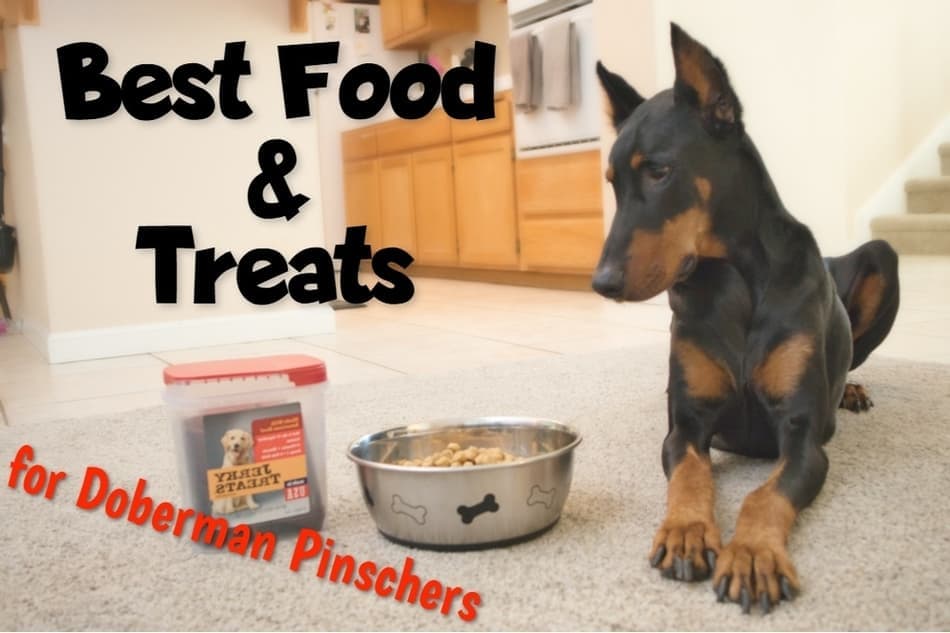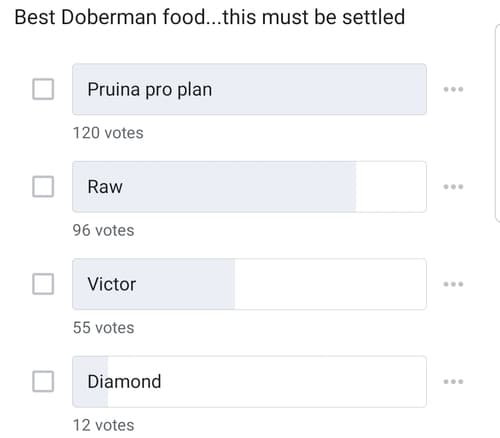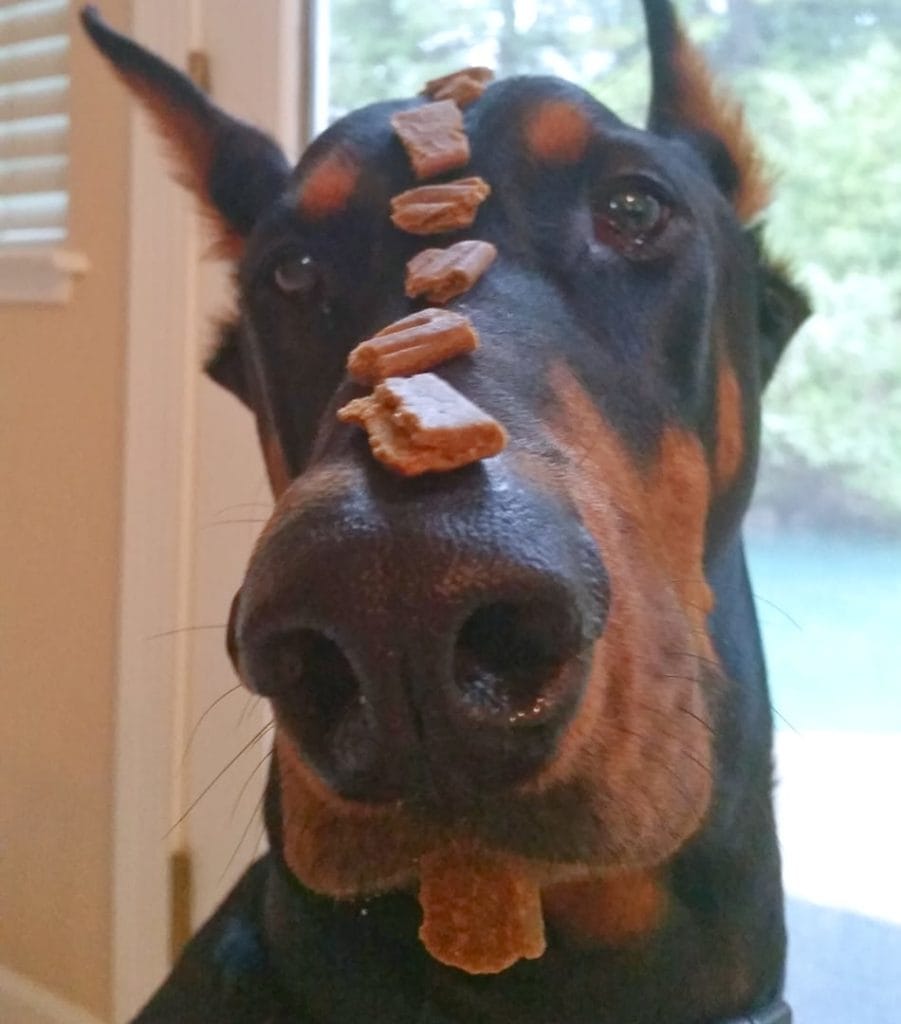
It’s far too easy to get overwhelmed when trying to pick the right dog food for your Doberman. It’s my goal to make this selection as easy as possible for you. In most areas of owning a Doberman, I recommend balancing cost with quality. With what your dog eats, however, it’s far more important to get high-quality dog food than it is to save a few dollars.
After many hours of research, personally trying multiple brands, and speaking with a large number of very passionate Doberman owners and breeders, I’ve concluded that these are the best dog foods for Dobermans:
To Really Spoil Your Dog:
Ollie Human-Grade Fresh Food Delivery – If you want to stick to fresh human-grade foods only (very popular in the Doberman world) my recommendation would be Ollie food. Ollie is highly trusted in the Doberman world and they customize their meals using human-grade fresh foods based on your dog’s specific age, activity level, and even to the Doberman breed specifically! They deliver fresh food weekly to your door and it’s so nice having freshly cooked dog food without having to worry about messing up the balance of vitamins, minerals, proteins, carbs, etc. Works great for puppies and adults. This is how you really spoil your dog.
These foods have the correct combination of quality protein, carbs, vitamins, and minerals in the most appropriate proportions for Dobermans. They also have omega-3 fatty acids and glucosamine which are both so important for this breed.

I recently changed my choice on the best dog food for Dobermans partially due to the FDA’s recent studies in regards to health issues surrounding certain brands of dog foods (see my article all about DCM in Dobermans here). Purina Pro Plan food seems to consistently be ranked as one of the healthiest foods for a Doberman. It also wasn’t named as a food linked to DCM (a serious health issue in Dobermans) in even one report to the FDA in their recent study. In fact, it was noted in the study that some veterinarians put dogs who were suffering from health issues while eating other foods, onto a Purina Pro Plan diet.
This brand has been around for a long time and is deeply trusted by breeders, show, and sport Doberman owners. It’s also one of the few dog food brands to meet WSAVA guidelines (very hard to do). Additionally, it’s also put through a feeding trial before being put on the market, which not every brand does. Finally, I’m not aware of any mandatory recalls placed on Purina Pro Plan foods. If you need more info on why this food is always recommended by so many serious dog owners, take a look at this Reddit discussion about this food.
For the best treats for a Doberman, click here to jump to the treats section of this guide.
Picking the Right Dog Food
With the products I recommend on this site, I am very careful to recommend products that are both reasonably priced and work great with Dobermans. For the food you feed your family companion however, I do advocate spending just a little extra. Spending a little more now on your dog food might not only extend the life of your Doberman but save you down the road on veterinary bills.
Just don’t cut corners with the food you give your pup, we can save you some money but cutting a few corners in other areas to make up for it. But for now, get your pup something high-quality to eat.
While a significant portion of this article is about picking a dog food with quality ingredients that are in the correct portions for Dobermans, it’s important to realize that every dog is a little different.
For example, Dobermans are generally susceptible to a gastrointestinal upset in the form of bloat. So while some dogs might react to one type of food negatively others may not.
If you are considering feeding your dog a raw diet, take a look at my article Should You Be Feeding Your Doberman Raw Meat to help you decide if a raw diet is right for your dog.
How Much to Feed Your Doberman
You should decide how much to feed your dog based on caloric needs, and not how many cups to give them. On the back of most dog foods, there will be a guide for how much you should feed your dog.
In general, here’s about how much your Doberman will likely require:
- Puppies (18 months of age and under): 1,800 calories per day.
- Healthy Adults (over 18 months of age): 2,100 calories per day.
- Senior Dogs (less active adults due to old age): 1,300 calories per day.
These are approximate numbers based on the average full-grown weight of a Doberman pinscher of 80 pounds. The average for females is around 70 pounds while males will typically be around 90 pounds full grown. Always check the packaging of your food to determine the correct portions for your dog.
The required number of calories for your dog depends heavily on their individual activity levels and you’ll need to adjust your food accordingly.
For example, a house Doberman who relaxes a lot and doesn’t get much activity may only need around 2,000 calories a day. Where a very active Doberman who’s undergoing agility or other intensive training may require closer to 3,400 calories a day. Keep an eye on your dog’s activity levels and weight, then adjust the portions accordingly.
How Often to Feed Your Doberman
When your Dobie is young, he’ll need more frequent feedings throughout the day. As he gets older, you can reduce the number of feedings all the way down to about two meals per day.
Here’s the typical progression for a Doberman pup as he grows.
- Puppy Doberman (6 to 12 weeks old): 4 meals per day.
- Young Doberman (12 weeks to 12 months old): 3 meals per day.
- Adult Doberman (1 year and older): 2 meals per day.
Make sure to spread out the meals evenly throughout the day. If you are feeding your pup three meals a day, do one feeding in the morning (breakfast), one halfway through the day (lunch), and one at night (dinner). If you are on a schedule of two meals a day, do one in the morning and one in the evening.
Don’t feed your Doberman only once per day. Some breeds of dogs may be able to get by with this schedule but not a Doberman. They have a lot of muscle and low body fat. They are also prone to bloat and this can become a bigger risk if they are only fed once a day.
Transitioning from Puppy to Adult Food
At around 18 months of age is usually a good time to transition your Doberman from puppy food to adult food. Do this gradually so you don’t upset your dog’s stomach. You can do this easily by mixing their new (adult) food in with their old (puppy) food in bigger and bigger portions until they fully transition.
Trust me, you don’t want to get a dog with an upset stomach who throws up on your new rug because you switched too quickly. Transitioning gradually over the course of 10 days usually does the trick without causing too much turmoil in your Dobie’s stomach.
So at day one, their meals should have very little (about 10%) of the new food mixed in with their puppy food. By day five it should be about half and half. By day 10, it should be only their new adult food in the bowl.
How to Identify Quality Dog Food
There are plenty of great high-quality dog foods other than the brands I recommended at the beginning of this article. If you want to choose a brand other than my top choices, here are some things to look for to help you find quality dog food.
Make sure the food you’re considering has the following:
- Some type of specific meat is listed in the first three ingredients. This means it should list the specific animal it comes from (buffalo, chicken, lamb etc). “Meat meal” or other nonspecific mentions of meat should be avoided.
- Human grade (USDA) or organic meats in the food. This isn’t 100% necessary and can be difficult to find in many brands of dog food. It’s great though if you can find it!
- AAFCO (Association of American Feed Control Officials) certification. If it says “for all life stages” next to the certification, it means it can feed your dog for life.
- Natural preservatives such as vitamins C and E (or Tocopherol). These are the better forms of preservatives.
- About 22% to 32% protein is ideal. Too much protein can agitate the kidneys of Dobermans so more isn’t necessarily better. Older dogs should generally eat a bit more protein than younger dogs (source).
- About 25% carbohydrates from complex carb sources such as peas, sweet potatoes, and legumes. Oats, rice, and barley are also good.
- 15% to 18% healthy fats including Omega-3 and Omega-6 fatty acids. These are very important for the health of your pup’s skin and coat. Salmon oil, flaxseed oil, and chicken fat are great sources of these good-quality fatty acids.
- Vitamins and minerals from fruits and veggies. Calcium is incredibly important for Dobermans during their younger years especially.
Making sure the food you get your Dobie has these things is the best way I’ve found to quickly identify quality dog food.
As I stated previously, if your dog isn’t doing well on one type of food (diarrhea, poor coat, itchy skin, allergies etc) it’s a good idea to try something new. Just make sure the new food is high quality and you transition slowly.
If you don’t have the time to go through all these ingredients on each dog food you’re considering, just start with the two recommendations I made above. You can’t really go wrong with those.
Ingredients to Avoid
I’ve found that many dog food manufacturers that produce cheap, low-quality foods will use some ingredients that really aren’t the best for your Dobie. Here are some of the ingredients you should avoid.
- Wheat, corn, and soy. These are cheap fillers in dog food and really provide very little nutritional value for your dog. They are not processed well by Dobermans and can lead to gastrointestinal upset and bloat. Avoid foods that have these in high amounts. Avoiding these completely might not be possible. In smaller amounts, these things can be fine and even help to prevent diet-induced DCM. But many dog food makers have a habit of really over-doing these ingredients since they’re cheap.
- Meat by-products. This is used in some low-end dog foods as a cheap source of protein. It will likely be made of slaughterhouse leftovers like brains, blood, and even chicken feet. These are poor sources for protein and can even contain diseases. If there isn’t a specific animal named for where the protein comes from, it’s likely a meat by-product.
- Chemical additives. These are artificial ingredients that are used to change how the dog food looks, tastes, or smells. You’ll be able to recognize these in the ingredients list because they are often listed as a dye number like “yellow 6” or “blue 2.”
- Rendered fat. This will add flavor to the food but is also a source of dangerous microorganisms and heavy metal toxins. Dobermans are susceptible to copper buildup in the liver which can be very dangerous. Rendered fat can make this situation significantly worse. It can also contribute to mold and bacterial growth in the food and make your dog sick.
- BHA and BHT. These are preservatives used in some cheap dog foods that are also widely considered to be cancer-causing. Their use has been banned in some countries already.
Basically, just avoid the incredibly tempting and super cheap dog foods that you find at Walmart. Take a few minutes to do a little research and don’t be afraid to spend a little extra money on quality dog food.
I promise I will help you save money on your dog in other areas such as toys, crates, beds, etc. But for the food you feed your pup, don’t cut corners and get Purina Pro Plan.
Best Treats for Dobermans
Having the right treats for your Doberman is incredibly important. They have two main purposes. First, they are a great training tool to entice your pup to learn new tricks or to follow commands. Secondly, they can be a great stress reliever, a dental hygiene tool, and a form of temporary entertainment for your dog.
Here are the two best dog treats for Dobermans that I’ve found so far for each purpose.
2. Bully Sticks Supreme All-Natural Dog Treats – This is my favorite treat for stress relief and dental care for Dobermans. They also take a little bit to consume so they’ll keep your dog busy and relieve stress for a short while. The 6-inch version works great for Dobermans of all ages but the 12-inch version isn’t a bad choice either.
After picking a good quality dog food like the two suggestions mentioned at the top of this page, get two types of treats, one to use for training and one for stress relief and dental care. Between the jerky treats and bully sticks mentioned above, you’ll have all your bases covered.

Why I Use These Treats
Jerky Treats Tender Beef Strips
These are great treats that Dobermans absolutely love. My dog has learned all the commands he knows by using these treats as a bribe. I can literally teach him a completely new command or trick which he’ll have down in just two days using these as a bribe (just by practicing twice a day).
Besides being basically a form of Doberman crack, they’re also good for them! They’re made in the USA, made primarily of real beef, contain calcium (which is incredibly important for Dobies), and also have Omega-3 and Omega-6 fatty acids. These promote great skin and a healthy coat.
Just make sure you keep these treats in some sort of airtight container (or just the tub they come in). If you put them in a cute “dog treat jar” sitting on your counter that isn’t airtight, they’ll dry out after about a week and won’t be near as delicious to your pup.
Bully Sticks
These are 100% natural, high in protein, low in fat, and do a great job of scraping away tartar and plaque from the teeth. This is important since Dobies are prone to dental problems. They’ll also keep the typical Doberman busy for at least 10 minutes or so.
When your dog chews this stick to about the size where he could swallow it whole, it’s time to take it away. They do smell fairly strong, but that’s part of the reason Dobermans love them. Dogs are very smell driven since they don’t have as many taste buds as humans do.
Treats to Avoid
There are definitely some treats that you should try to avoid. A lot of these have to do with the special dental considerations of Dobermans. These treats are:
- Rawhides. They can contain preservatives and other chemicals dangerous to dogs. This includes artificial flavors and colors. They can also cause choking and obstructions in your dog’s digestive tract.
- Beef marrow treats. These are just too hard for Doberman teeth and can lead to a chipped or cracked tooth.
- Antlers or horns. These chew toys are also too hard for Dobies and can easily cause dental problems.
It’s also worth mentioning to never feed your dog any table scraps. Many foods that are fine for humans can be very unhealthy or even toxic to dogs.
These include onions, chocolate, soy, macadamia nuts, grapes, raisins, citrus of any kind, coffee, and tea. There are plenty of other household dangers for your Dobie (too long to list here), so just don’t feed your dog table scraps. Besides, it teaches your dog to beg while you eat which can be very annoying when you have family over one day for a visit.
Final Thoughts
The biggest takeaway I want you to get from this article is that the food and treats you get for your Doberman are not the areas where you want to skimp to save some money. Follow my recommendations on this site and I will definitely save you money in other areas (I promise), but first, I want to make sure your Doberman is eating some high-quality foods for a long and happy life.





